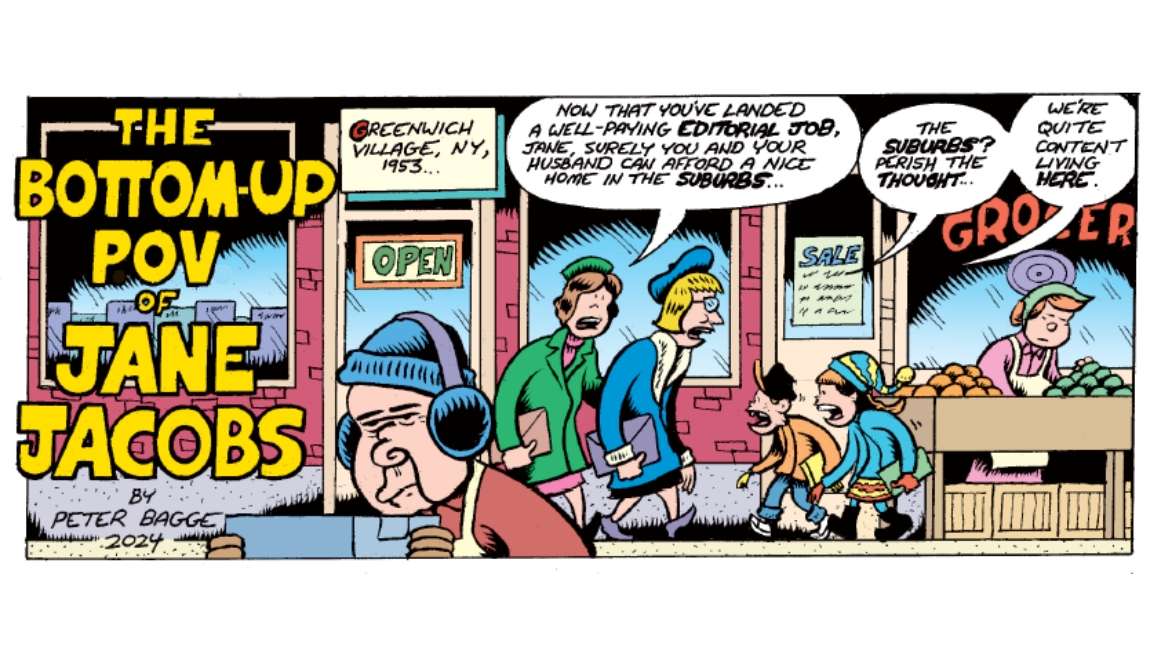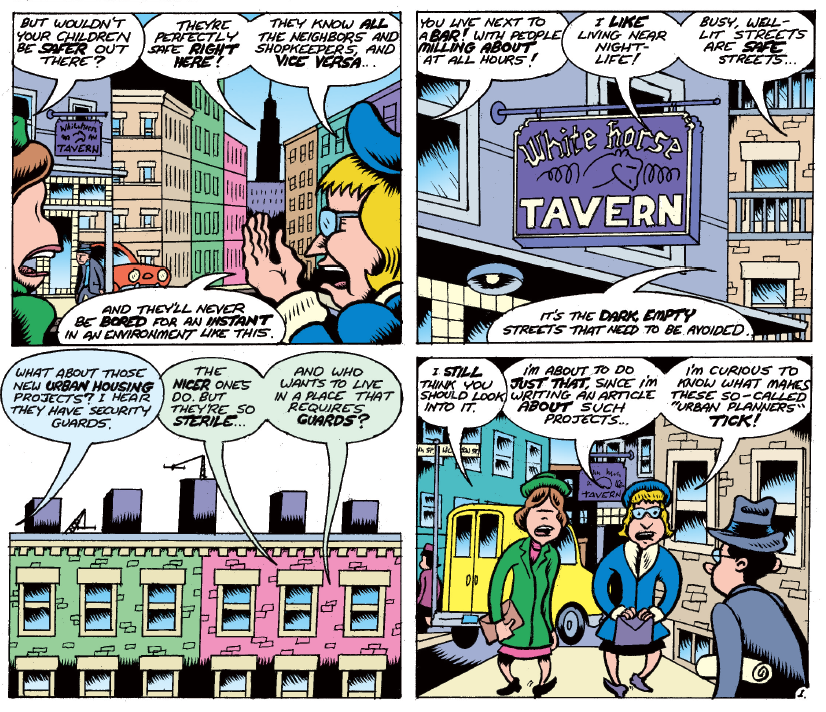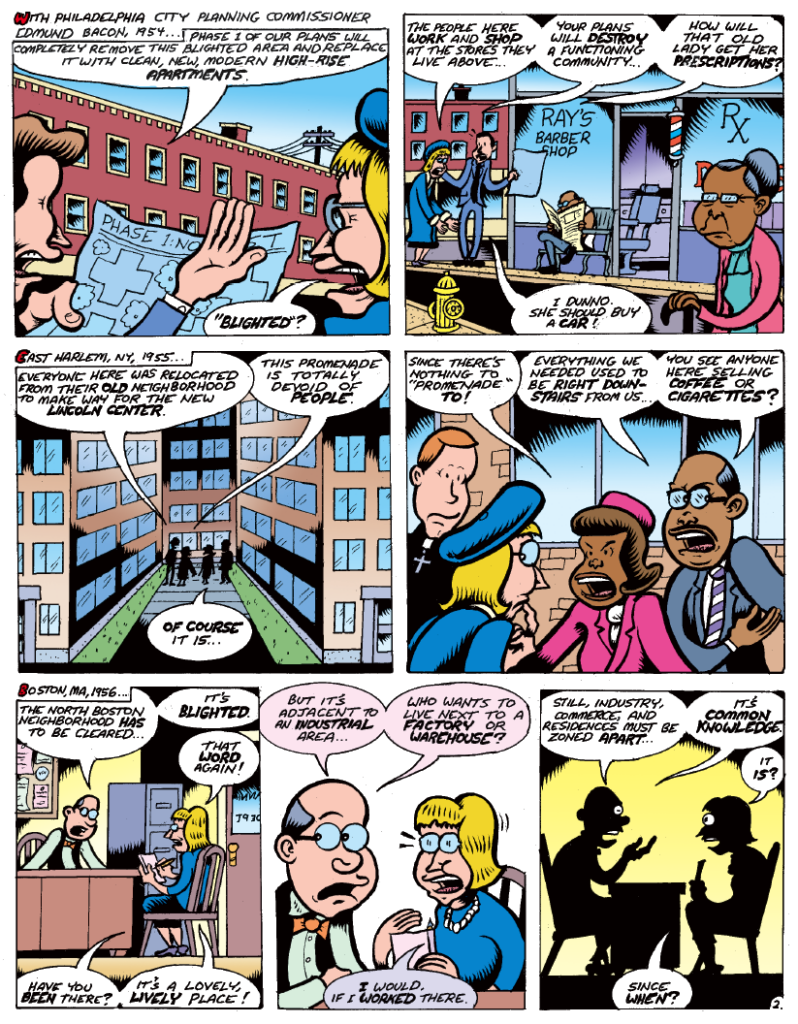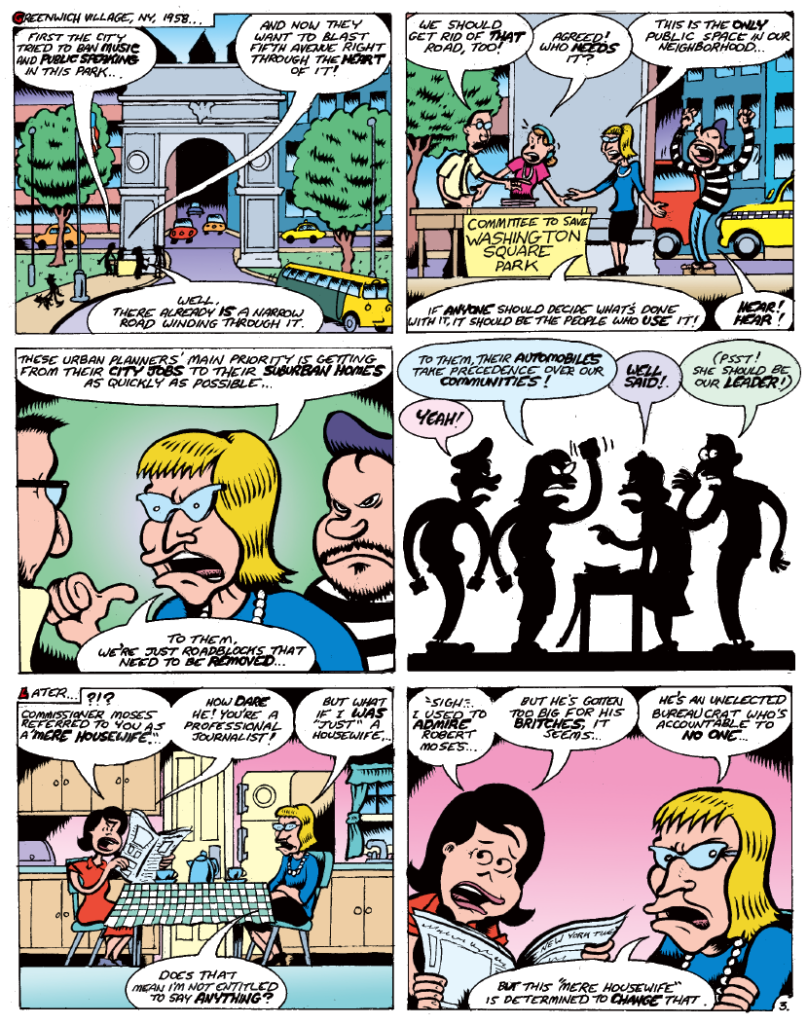Comic: The Bottom-Up POV of Jane Jacobs
Challenging the common knowledge of urban planning
Editor's Note: As of February 29, 2024, commenting privileges on reason.com posts are limited to Reason Plus subscribers. Past commenters are grandfathered in for a temporary period. Subscribe here to preserve your ability to comment. Your Reason Plus subscription also gives you an ad-free version of reason.com, along with full access to the digital edition and archives of Reason magazine. We request that comments be civil and on-topic. We do not moderate or assume any responsibility for comments, which are owned by the readers who post them. Comments do not represent the views of reason.com or Reason Foundation. We reserve the right to delete any comment and ban commenters for any reason at any time. Comments may only be edited within 5 minutes of posting. Report abuses.
Please to post comments







She had an amicus curia submission when Kelo was being decided.
We love our technocrat scientific planners, like Robert Moses, until their science prioritizes values that we do not share.
So today we have planners who want to foster a careless, urban environment on everyone whether they like it or not.
Have you read The Power Broker? Moses was no technocrat. He was a power mad bigoted political figure and a Republican.
Nowhere in this "comic" does it mention the failing infrastructure of Jane's neighborhood. Some people prefer urban life and some do not. That's not the point. The point is that only corrupt, powerful government and its public employee and police union coalitions can - just barely - manage to cope with the growing maintenance issues of aging high population density centers. The cities are one strike or one water, sewage, electricity, natural or transportation incident away from a major disaster.
That's not where the financial hole is in the US. The high density areas are the cash cows of urban areas. Including the low-income high density areas. Land prices generally rise faster than maintenance costs - so maintenance and replacement costs can easily be financed, sustainably, by land-based taxes. Esp if density also means those higher land values per acre have land taxes spread over more people.
US is in financial trouble because of the way we finance new construction of infrastructure. Basically the post-WW2 suburban model - where new construction/development in one place is financed via bonds paid for via property taxes in other places (or via federal or state level debt).
The place where that development took place does not amortize their own maintenance/replacement costs. Instead they use prop taxes to pay more for schools, parks, etc and fly blind to any future expenses when they happen. Older areas pay for their maintenance/replacement - and the bonds for new construction elsewhere - and the schools/parks/etc. As the inner suburbs 'fail' to grow, just when they start having to pay maintenance; they get absorbed by older cities.
A great example is an article today about Houston.
Nowhere is the Growth Ponzi Scheme more evident than in Houston. The city has grown from 600,000 at the end of World War II to 2.3 million today. In 1950, Houston was 113 square miles; today it is 640 square miles. In other words, they have grown their population by 380% by growing their land area by 570%.
The city’s explosive growth was accomplished through annexation, developer-driven expansion, and public infrastructure investments meant to accommodate continued outward expansion. Each of these outward leaps costs more than the last and provides a tax base that is, in comparison, less financially productive.
And yeah - the point is not that some people prefer burbs where others prefer city. Obviously that's true. The problem is that financially, sprawl is free or at least subsidized. And just because people want a free lunch doesn't mean that should be accommodated.
Houston and New Orleans had about the same population in 1950. It is because of those capitalism driven annexations that it now has 8x the population of New Orleans, much more economic opportunity, and a much lower crime rate. New Orleans has had the same boundaries since the 1870s.
There is not one big city in the US where the municipal finances improve via expansion. Municipal sprawl is always a Ponzi game with dishonest accounting. Not a 'capitalism driven annexation'.
Cities throughout history have always grown the same way until WW2 changed the model here in the US. Incremental small-scale growth - one building at a time. Villages that once were separate gradually merge and are connected by transport but retain their separate character as 'neighborhoods'. If one development fails, it doesn't matter. Tear it down, build another in its place.
The post WW2 US model is big developer big bank big gummint financing of massive projects. The entire system must be turned into a cronyist trough. If it fails - then create a crisis and subsidize upwards and tilt everything towards making it appear to succeed. Via manipulated interest rates and financial bubbles if necessary. The best example of the US model (absent the obsession with detached houses) is actually China now.
As for New Orleans. Being under sea level - and in Louisiana - is your ceteris paribas?
And those outer suburbs, Sugarland, Katy, La Porte, and Pasadena, are where the wealth is concentrated. Most heavy industry isn't even in Houston proper anymore, stretching east across the ship channel and south down to Galveston, with all the expansions being in east Baytown. This asserts that it's a Ponzi scheme, but I am not convinced
Jane's neighborhood in NYC is doing great. The main problem is that most of us can't afford to live there.
It's pretty easy to try to get your own town to answer the following questions. More likely now in small towns rather than cities or suburbs but very much both a Jane Jacobs type location and, most likely, very strong local finances.
Take a photo of your main street at midday. Does the picture show more people than cars?
If there were a revolution in your town, would people instinctively know where to gather to participate?
Imagine your favorite street in town didn’t exist. Could it be built today if the construction had to follow your local rules?
Is an owner of a single family home able to get permission to add a small rental unit onto their property without any real hassle?
If your largest employer left town, are you confident the city would survive?
Is it safe for children to walk or bike to school and many of their other activities without adult supervision?
Are there neighborhoods where three generations of a family could reasonably find a place to live, all within walking distance of each other?
If you wanted to eat only locally-produced food for a month, could you?
Before building or accepting new infrastructure, does the local government clearly identify how future generations will afford to maintain it?
Does the city government spend no more than 10% of its locally-generated revenue on debt service?
Would that the Bronx had had a Jane Jacobs to stop the Cross Bronx Expressway.
The Boston neighborhood that was "renewed" in the 1950s was called the West End.
What a treat. Nothing perks up a copy of Reason quite like Peter Bagge cartoon!